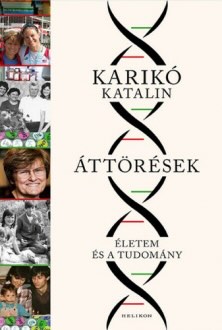Adventure Code

Personal blog
Breaking Through (Áttörések) - by Katalin Karikó, 2023
Three main themes
-
Firstly, the book presents lots of historical information, describing how life was growing up in a small Hungarian town, during the socialist regime.
-
Secondly, it tells the story of a scientific career, from early education (high school, university) throughout the various jobs and research projects taken in different institutions, and the relationships with colleagues and bosses.
-
And thirdly, it's an ode to perseverance. Despite all the hurdles, naysayers and hardships experienced, the author believed in herself, her skills and followed her curiosity stubbornly for multiple decades, which ended up leading to a significant breakthrough in medicine.
Main Takeaways and Topic
Kariko comes form humble circumstances
- Born in 1955, in a small town of Hungary. Her father was a butcher, they had no running water in the house, in winter the whole family slept in one room, which was the only room they could heat. She grew up close to nature, helped the family in all kinds of works around the house, some of this was like a play for her, there was no separation in her mind between work and play.
She lived through some pandemics as a small child and saw the benefits of vaccines first hand
-
In 1963, there was a foot-and-mouth viral infection outbreak, which was affected cows in the area, which meant the livelihood of many families. It is not dangerous for humans, but humans are carriers and so she remembers lockdown and staying at home for several weeks, washing hands and using disinfectants. People seem to forget, that pandemics happen from time to time.
-
There was an influenza outbreak (H3N2) in 1968, originating from hong kong, which again meant restrictions and disinfecting.
-
She was also witness of the benefits of vaccines, in her early child hood vaccines against polio and tuberculosis were already saving lives of children. As before many families were loosing their young due to these diseases.
Life in socialist Hungary
-
Her father became an enemy of the state, by just trying to help the neighborhood, and was fired and could not get a legal job anymore. He had to do "illegal" animal slaughters at night to get money.
-
On the other hand, the socialist regime made sure to support and push kids of worker class parents, and she had all the opportunities to study and got scholarships - which was a result of her hard work, but also the opportunity offered by the regime.
-
Once she had her kid, she did not want to give up on research and her scientific career. Fortunately, the child care system was affordable and of high quality, which meant that parents could rely on it and still have careers.
-
As she was a good researcher she worked together, met and collaborated with international colleagues. She was asked/blackmailed by the secret service of Hungary to spy on the international colleagues. Out of fear she agreed to it, but never submitted any reports.
Research projects and scientific career
-
First job was about liposome, small phospholipid sphere, that can enter the cell.
-
Second major project was about creating an antiviral drug (interferon RNA 2-5A), and introduce it into the cell. There compined with the RNAz enzyme, this would break down the double-stranded RNA, which is typical of viruses.
-
When financing for her work project stalls, she is fired from her job, even though she was doing a great job. First reaction was anger and a feeling of unfairness, but then she switches to focusing on what she can control - namely look for a new job opportunity. Spheres of control theory, focus on/act on what you have control over/influence over.
-
In europe she could only get a research job, if she bring a scholarship or a grant, which was impossible from socialist Hungary at that time. So she decides to try applying to jobs in the USA.
-
In her first job in the US she did well, but her boss was a jerk. She worked hard for three years and when she wanted to leave her job, she was threatened to be fired and deported.
-
In her later job at Penn university, she was judged as an average researched. Even though she did great experiments and published good papers, she did not bring any financing to the institution (her skills were not selling her work), and the metrics used to judge researchers was dollar per square meter of laboratory. After many years of friction with management, they took away her lab and she quit and joined a startup in Germany, where she contributed to developing the first mRNA based vaccines.
Relationship with daughter
-
It's really important to have someone who believes in you, who stands up for you, who cheers for you. As a parent she was always cheering with maximum effort for her kid in any sport event, even she taught of her cheering as embarrassing. Still, she would do it to this day.
-
Similarly, she had colleagues in her career, who believed and cheered for her (Elliot, David, Drew), who took her side and helped her continue her research.
-
There were frictions with her daughter: preparing for the SAT test. She wanted Zsuzsi to gave it her all for the exam. Effort, passion and perseverance is needed in a world, which is indifferent towards you. The lukewarm attitude towards the exams made her fear, that Zsuzsi would have this attitude towards other things in life.
-
Without clear goals and objectives, Zsuzsi was lost in the first year of Penn university. Her mom was working towards the same goal passionately, even obsessively, and could not really understand what her daughter is going through.
Karikos learnings and reflections on life
-
Nature answers reluctantly, and only tell you a quiet yes or nor, if you are asking it in the precise language of experimentation (A természet vonakodva válaszol, csak akkor mond egy-egy halk igent vagy nemet, ha a kísérletezés szabatos nyelvén faggatózunk)
-
In general people who are looking for excuses don't really want to do the work (Általában csak az keres kifogásokat, aki valamit nem akar megcsinálni)
-
Science history is full of stories, where very smart people laugh at good ideas (A tudomány története tele van esetekkel, ahol nagyon okos emberek kinevetik a jó ötleteket)
-
Living in a new country is interesting, at the beginning you cannot differentiate between the generic and the unique. If someone acts weird, in a way you are not used to, you cannot tell if this is because a culture difference and everyone acts like that (generic), or you just happen to meet a weird person (unique).
-
Everything you are working for is going to be much more valuable, if you gave it your all (Minden amiért megdolgozol, sokkal értékesebb lesz, ha tényleg mindent beleadtál)
-
She believes her work was important and brought about change in the world, but she also recognizes that many things had to go the right way for this to happen. There as luck of course as well, but also a lot of help and support from colleagues. And all this makes you think and makes you responsible for others: who in your circle could need a bit of luck, a little help and support? What are we missing out on, by not offering this support for others?
